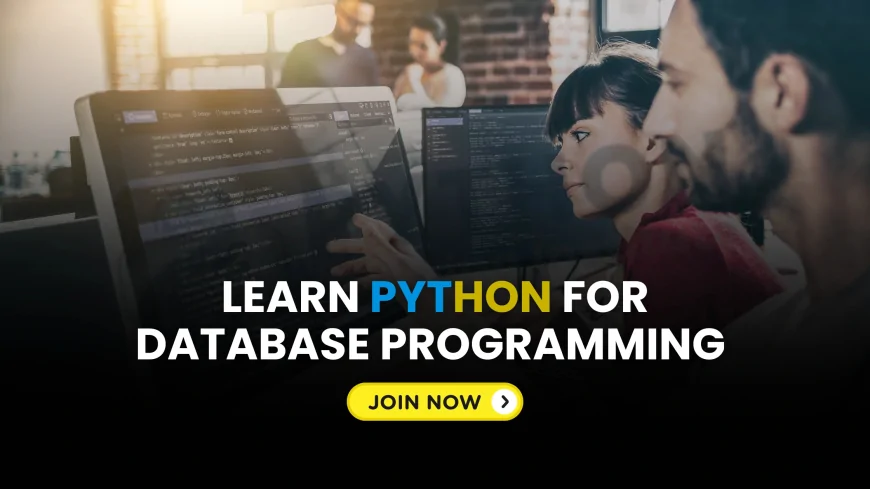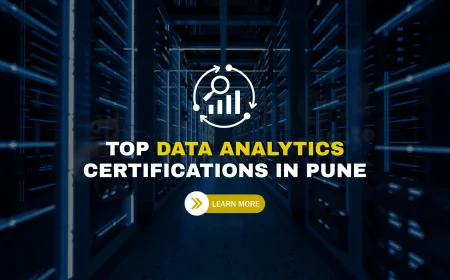Best Python Database Programming Training Pune | Top Python Training for Database Programming in Pune
Explore the best Python database programming training courses in Pune. Learn SQL, ORM, NoSQL, and build real-world data projects with placement support. Ideal for backend developers and data engineers.

Table of Contents
- Introduction
- Why Python for Database Programming?
- Core Concepts & Technologies
- Top Python DB Training Institutes in Pune
- Project-Based Learning Examples
- Learning Formats & Duration
- Placement & Career Outcomes
- Fees & ROI Analysis
- How to Choose the Right Course
- FAQs
- Conclusion
Introduction
Database programming is a foundational skill for backend development, data engineering, and analytics. In Pune, several institutes offer in-depth Python-based database training, teaching students to use SQL, ORM frameworks, and NoSQL databases like MongoDB. These practical programs equip learners to build scalable, data-driven applications from scratch.
Why Python for Database Programming?
- Readability: Python's syntax makes database code clean and maintainable.
- Versatility: From simple SQLite scripts to complex ORM-backed apps and MongoDB services.
- Industry demand: Pune's IT hubs in Hinjewadi and Magarpatta actively seek Python‑DB professionals :contentReference[oaicite:6]{index=6}.
- Rich ecosystem: SQLAlchemy, Django ORM, PyMongo, and built-in connectors simplify work.
Core Concepts & Technologies
| Area | Topics | Applications |
|---|---|---|
| SQL | Joins, Subqueries, Indexing, Transactions | Data querying & reporting |
| Python-DB API | psycopg2, MySQL‑connector, sqlite3 | Scripting & ETL |
| ORM | SQLAlchemy, Django ORM | Maintainable app development |
| NoSQL | MongoDB, PyMongo | Document-based data models |
| Caching | Redis, Memcached | Performance optimization |
| Migrations & CI/CD | alembic, Flyway, GitHub Actions | Versioned schema changes |
Top Python DB Training Institutes in Pune
-
Webasha Technologies – Python + Database Course Features
-
Modules Covered: SQLite, MySQL, PostgreSQL integration with Python
-
Duration: 6–10 weeks
-
Mode: Both online and classroom options available
-
Tools: PyMySQL, SQLAlchemy, and direct DB API usage
-
Placement: Assistance with resume, interview prep & mock sessions
-
Extras: Live project on data CRUD operations using Python Flask/Django
-
Project-Based Learning Examples
- Library Management App: CRUD operations via Flask/PostgreSQL, RBAC, and UI integration.
- Data ETL Pipeline: Pulls data via API, transforms with Pandas, inserts into MySQL.
- Analytics Dashboard: SQL queries exposed via FastAPI, visualized in React or Dash.
- MongoDB CRM Tool: Python CRUD web app with document-based schema flexibility.
- Job Automation System: Database-backed task scheduler with Redis caching.
Learning Formats & Duration
- Full-time Bootcamps (8–12 weeks): Intensive live sessions and project work.
- Part-time/Weekend Batches: 3–4 months, flexible evening/weekend schedules.
- Hybrid or Online: Blended theory, live labs, and assignments with recordings.
- Self-paced with Mentor Support: Pre-recorded modules supported by weekly live review sessions.
Placement & Career Outcomes
- Graduates often land backend developer, data engineer, or full-stack roles in Pune tech hubs.
- Upshot and CNC actively assist with mock interviews, real-job questions, and resume prep :contentReference[oaicite:13]{index=13}.
- Even freshers report starting salaries between ₹3–7 LPA, scaling higher with projects :contentReference[oaicite:14]{index=14}.
Fees & ROI Analysis
-
Fees: ₹18,000 – ₹25,000
-
Duration: 6 to 8 weeks (weekend and weekday options)
-
Includes: Core Python, SQL/MySQL/PostgreSQL, live projects, and job support
-
ROI Highlights:
-
Real-world DB integration projects (Flask/Django)
-
Resume and mock interview support
-
Placement support with reputed IT firms
-
ROI Rating: ★★★★☆
-
Break-even time: 1–2 months post-placement (average salary ₹3.6–6 LPA)
-
With in-demand skills and local support, learners usually recover fees within months via salary increase or freelance earnings.
How to Choose the Right Course
- Ensure database modules cover both SQL & NoSQL thoroughly.
- Review sample projects (e.g., ETL, web apps, database scripts).
- Prefer batches with coding labs, not just theory.
- Small batch sizes (<20) allow personalized mentorship.
- Placement support matters—mock interviews and resume reviews are essential.
- Check access to recordings and ongoing content updates.
FAQs
1. What is Python database programming?
It involves writing Python code to perform CRUD operations, work with ORMs, integrate NoSQL databases, and handle database migrations.
2. Do I need prior SQL or Python knowledge?
A basic understanding helps, but courses typically start from scratch and ramp up quickly.
3. Which databases are covered?
Popular ones include MySQL, PostgreSQL, SQLite, MongoDB, Redis, and ORM tools like SQLAlchemy.
4. Are NoSQL databases included?
Yes—MongoDB and PyMongo are commonly taught alongside traditional SQL.
5. Will I build real-world projects?
Absolutely—web apps, ETL pipelines, analytics dashboards, and automation scripts are standard projects.
6. What career roles does this training prepare me for?
Roles include Backend Developer, Data Engineer, Full‑Stack Developer, and Database Specialist.
7. How long does training usually last?
60 hours to 4 months, depending on part-time or full-time format.
8. What is the typical fee range?
Batches cost ₹10k–₹45k depending on depth and placement support.
9. Is placement support included?
Many institutes offer resume prep, mock interviews, and job placement assistance.
10. How small are the batches?
Usually capped at 15–20 students to allow personalized mentoring.
11. Is learning online an option?
Yes—live online, hybrid, and self-paced formats are available in Pune.
12. What projects build a portfolio?
Build applications like Library Management systems, ETL dashboards, and web automation tools.
13. Do they teach database migrations?
Yes—tools like alembic and Django migrations are commonly covered.
14. What kind of after-class support?
Support varies—Upshot and CNC provide forums, mentorship, and interview prep programs.
15. Do I learn both SQL and NoSQL?
The best courses cover both relational and document-based databases.
16. What are the salary expectations?
Freshers earn ₹3–7 LPA; with experience and project work, ₹8–12 LPA is achievable.
17. Is certification included?
Yes—course completion certificates and project showcase documents are provided.
18. Can I freelance after training?
Definitely—database programming skills are widely employed in freelance backend and data tasks.
19. How quickly can I complete a course?
Fast-track bootcamps finish in 8–12 weeks; part-time options take 3–4 months.
20. How do I choose the best institute?
Compare based on hands-on modules, project portfolio outcomes, placement support, instructor quality, and batch flexibility.
Conclusion
Python database programming is not just a module—it’s a marketable skill. In Pune, you’ll find several superior training programs—from bootcamps to hybrid models—that teach SQL, ORM frameworks, and NoSQL workloads combined with real, data-driven projects. Choose an institute offering hands-on labs, placement support, credible instructors, and a strong project portfolio to ensure swift career growth and tangible returns.
What's Your Reaction?
 Like
0
Like
0
 Dislike
0
Dislike
0
 Love
0
Love
0
 Funny
0
Funny
0
 Angry
0
Angry
0
 Sad
0
Sad
0
 Wow
0
Wow
0















